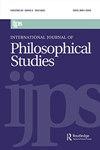自然主义与现象学的规范性
IF 0.6
3区 哲学
0 PHILOSOPHY
INTERNATIONAL JOURNAL OF PHILOSOPHICAL STUDIES
Pub Date : 2022-10-20
DOI:10.1080/09672559.2022.2160782
引用次数: 1
摘要
本体论自然主义和现象学思想在规范性是否可以简化为物理实体的问题上存在着尚未解决的对峙。虽然本体论自然主义的思想路线在分析哲学中已经确立,但自然主义的支持者在很大程度上忽视了规范性不可还原性的现象学推理。借鉴胡塞尔、海德格尔、舒尔茨、斯坦等人的作品,我重建了一种现象学论点,根据这种论点,自然科学(作为归化项目的基础)本身就是本质上规范的生活世界的一部分,大意是本体论自然主义面临着一个自我引导的问题。我的目的是证明,这种对峙是基于对削减可能性的深刻分歧。最后,我认为,这种深刻的分歧引发了一个问题,即关于(自然)科学本质的哪个概念是正确的。这一结果使完美主义的科学模型(由本体论自然主义所暗示)与实用主义的科学概念(支持现象学论证)对立起来。其动机是,将对有争议的原则的分歧转化为对科学概念的分歧,可能有助于为解决僵局的不同尝试提供基础。本文章由计算机程序翻译,如有差异,请以英文原文为准。
Normativity between Naturalism and Phenomenology
ABSTRACT There is an unresolved stand-off between ontological naturalism and phenomenological thought regarding the question whether normativity can be reduced to physical entities. While the ontological naturalist line of thought is well established in analytic philosophy, the phenomenological reasoning for the irreducibility of normativity has been largely left ignored by proponents of naturalism. Drawing on the work of Husserl, Heidegger, Schütz, Stein and others, I reconstruct a phenomenological argument according to which natural science (as the foundation of naturalization projects) is itself a part of the essentially normative life-world to the effect that ontological naturalism faces a bootstrapping problem. I aim to demonstrate that this stand-off is grounded in a deep disagreement about the possibility of reduction. I close by arguing that this deep disagreement turns on the question which conception about the nature of (natural) science is true. This result pits a perfectionist model of science (implied by ontological naturalism) against a pragmatist conception of science (in favour of the phenomenological argument). The motivation is that transforming the disagreement about the controversial principle into a disagreement about conceptions of science may help to offer a foundation for different attempts at solving the stand-off.
求助全文
通过发布文献求助,成功后即可免费获取论文全文。
去求助
来源期刊

INTERNATIONAL JOURNAL OF PHILOSOPHICAL STUDIES
PHILOSOPHY-
CiteScore
0.90
自引率
0.00%
发文量
29
期刊介绍:
The International Journal of Philosophical Studies (IJPS) publishes academic articles of the highest quality from both analytic and continental traditions and provides a forum for publishing on a broader range of issues than is currently available in philosophical journals. IJPS also publishes annual special issues devoted to key thematic areas or to critical engagements with contemporary philosophers of note. Through its Discussion section, it provides a lively forum for exchange of ideas and encourages dialogue and mutual comprehension across all philosophical traditions. The journal also contains an extensive book review section, including occasional book symposia. It also provides Critical Notices which review major books or themes in depth.
 求助内容:
求助内容: 应助结果提醒方式:
应助结果提醒方式:


